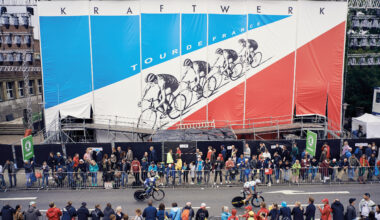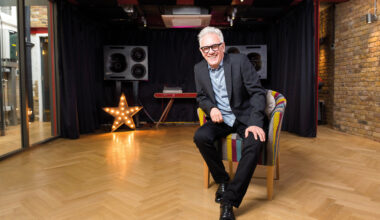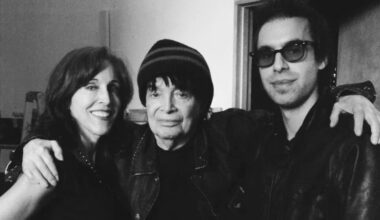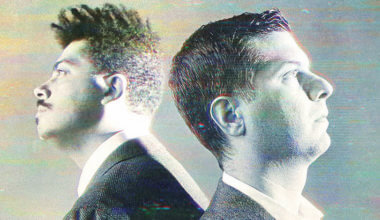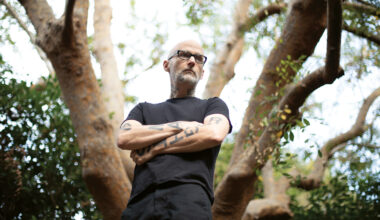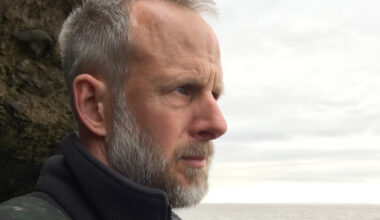With their third album ‘Hormone Lemonade’, Cavern of Anti-Matter set a new benchmark for inspired modular Pulsations. “I’m nowhere near mastering anything to do with music,” shrugs their leader, Tim Gane. We beg to differ…
Tim Gane is a different kind of normal. He’s been making music for over 30 years and loathes the idea of being known as an artist. Over an hour-long conversation, he comes across as forthright, open, thoughtful and light-hearted. He talks about comparisons with the Cockney Rejects. He explains why he chooses to work with people who have little regard for his music. And this being Electronic Sound, he mentions the time he saw Kraftwerk at a disco in Cologne. Or maybe it was Düsseldorf.
Either way, he makes more sense than many musicians who have to endure being interviewed for the purpose of promoting their new album. It’s called ‘Hormone Lemonade’, by the way. It’s the third Cavern Of Anti-Matter album, out now on the Duophonic label. And it’s ace.
But first, the heavily abridged version of Tim Gane’s life story. He grew up in Manor Park in the London borough of Newham. Steve Marriott of The Small Faces was born there. ‘Itchycoo Park’ is not the only song named after a local landmark. Cavern Of Anti-Matter was the name of a sweet shop in Manor Park from Gane’s childhood. When he wasn’t blowing his pocket money on penny chews, he was steeling his resolve to “do music”.
“It wasn’t a choice” he says, “It was an absolute situation. I’ve lived a great deal of my life with blinkers on, sort of avoiding things that would get in the way of me doing the things I wanted to do. Part of that is about the situation I found myself in growing up as a teenager. I knew I didn’t want to live a suburban life.”
Those blinkers have served Gane well. First there was the gently furious McCarthy, formed by a group of friends at Barking Abbey Comprehensive School in the mid 80s. They became indie darlings when the phrase was used without an accompanying sardonic sneer.
Then came two decades of wondrous melodies with Stereolab. In the beginning, it seemed as if Gane was at the heart of this community of warm souls including former partner Lætitia Sadier and regular collaborator Sean O’Hagan. They hung out on the fringes of Brixton and Camberwell, in South London, doing their own thing, living life at their own pace.
Gane will happily recall all-nighters at The Scala and gigs at The Ambulance Station on the Old Kent Road. Then there were times when everything seemed to be focused around the small north London venues of Camden and Chalk Farm.
“It’s not nostalgic, this was our normality,” he says. “It felt like there was progressive edge to London. People striving to make more of life, whether it was in art or music, or anything that involved some kind of creativity. And that’s how Berlin felt when we moved there.”
Gane first visited Berlin in the 80s, a time of squats, DIY bars and a wild disorder that put London in the shade. In 2004 he moved there with the idea of trying it out for a couple of years.
“I can pretty much do music anywhere,” he says, “but I don’t like the countryside that much. Everything here is a little bit wider, a little bit taller and a little less tense. People still seem to have enough time to just hang around, taking their time.”
So do you consider yourself to be a Berliner now?
“I’m not a Berliner, no. I’ve never been a local. No, no, no. I’ve never been like that. I’ve positively avoided that all my life.”
Why?
“I dunno,” he shrugs. “It’s back to that reason why I got into music, to escape that suburban death. I get very nervous. My senses start tingling when I feel I’m getting trapped. It’s not about freedom or anything like that, I just need to avoid having that interconnectivity all the time, having everything being the same all the time.
“I tend to be a bit reclusive. I’m not a reclusive person at all really, it’s just that I tend to put it on a little bit just to keep that distance between myself and other things going on. I don’t get involved in the kind of social rhythm that makes you a real Berliner or a real south Londoner. I always want to keep a tiny bit detached from everything going on around me. I don’t like the idea of having something that makes me grounded, a place that might be part of my identity. It makes me really nervous just thinking about it.”
Moving to Berlin has caused Gane to be aware of a change in perspective when he goes back to London. He feels the “big town hustle” more intensely than he used to. Some might say that in the time he’s been away London has become a city to survive for more people, rather than a place to progress.
“It takes me a day or two to speak normally again,” he says. “I’m so used to not being totally understood in Berlin, I feel the same in London. Even though we’re talking the same language, I don’t feel like I’m understood. I’ll end up speaking no languages. I don’t really know German and at the same time I seem to be losing my English. I might end up with no language at all!”

He makes it sound like the idea doesn’t bother him one bit. Sitting on a Berlin bus, he enjoys the fact that he can’t understand what the people around him are talking about. He can tune in and tune out. That’s why, he explains, he’s never engaged with social media.
“I don’t want anything I can never turn off,” he says.
And if that wasn’t enough of a life lesson, while the rest of us fill the hours with stuff, romanticising about the past and trying to design a perfect future, Gane is deliberately, wilfully, determinedly living in the present. It’s fair to say that he is obsessed with THE NOW.
“I never like to think too far in the future and I never want to think about the past,” he admits. “The past is quite depressing. I don’t hate it, nothing bad happened, it’s just that I find the idea of being nostalgic, that thinking things might have been better back then, it’s pretty depressing.”
A couple of things seem to govern Gane’s approach – the unpredictable and the unintended. Like that time he was cycling to his studio space in Berlin wondering why someone had chalked “Hormone Lemonade” on the floor.
“It’s just the usual gobbledygook,” he says. “If I’d spent weeks going through a thesaurus searching for some interesting juxtaposition of two words, I wouldn’t have come up with anything better. The unexpected event is always more powerful than that thing you dedicated yourself really seriously towards achieving.”
And that, in a nutshell, is how Gane created the new album. It all started with the band’s synth whizz Holger Zapf and the unpredictable joy of his homemade drum machines. Gane kept the tape running as they fiddled and faffed for a few hours. Then he spent a couple of weeks editing the material down, moving things around into some kind of structure. Gane would try and get a groove going by playing around with some sequencers, maybe a goofy guitar riff. Then, with barely anything to work with, Joe Dilworth, who Gane has worked with since the early Stereolab days, came in to record the drums.
“Gradually things would progress from there,” adds Gane. “I’d add bits of colour, try to get more variations going on, strange chords, something more exotic to break the machine-like spell of a track. A great thing happened when I asked Holger whether the oscillators could do chords. He said, ‘Yeah, we can try, but I don’t know what’ll happen’.”
The portentious drone bursts that set off the opening track ‘Malfunction’ are the result. Zapf’s ability to present Gane with opportunities to explore is probably why the album works so well.
“I’m nowhere near mastering anything to do with music,” admits Gane. “I’ve never been anything more than an average garage-punk guitar player and the rest is just plonking on things. It’s always kept me in the position of being a beginner, which is what I want. It took me years to realise that.
“What I am good at is responding to something I might have set in motion, deciding what’s interesting and what’s not. It’s recognising when something is open to possibilities, when you can see a glimpse of something. It’s always hot. It’s always done in the moment. If you know what you’re doing, it must get quite boring…”
To some people, ‘Hormone Lemonade’ will come across as a seriously complex piece of analogue electronica.
A series of retro-futuristic grooves, pulsating with meaning. Hopefully some might also think of it in less sombre terms – a smart collection of songs made for those alien discos of the imagination. It’s a living, breathing piece of fizzing fun. Yes, FUN.
“It almost sounds wrong to say that,” admits Gane. “But, yeah, it was fun. We do things on quite a light-hearted level. OK, so we’re not exactly larking about like The Goodies or whatever, but there’s no deep thought going on.
“I like a certain immediacy, you know. I like a melodic sensibility, but that doesn’t mean you have to do it in a normal, ordinary way. The tones and drones have this harmonic quality to them that sounds interesting. The thing is, people can make Cavern Of Anti-Matter or Stereolab before that sound like heavy weather. It’s completely the opposite of that. Everything is ‘Let’s do this, let’s try that. Let’s just mess about a bit and see what happens’.”
Tim doesn’t need much persuasion that it’s time for a re-evaluation of the stereotypical narrative that portrays people involved in making analogue electronic music with brow-furrowing seriousness.
“Because you’re putting yourself up to represent the music so much is assumed,” he says. “It’s very rare that you meet someone who is as serious as their public persona. I don’t know the Kraftwerk guys very well, but I did see them dancing in a disco in Cologne one time. No, hang on, it was in Düsseldorf.
“Maybe it’s something to do with the type of sounds and the equipment people use that suggests they’re some kind of experts, whereas a band like Cockney Rejects are just a bunch of people having a go. It could be that the Cockney Rejects went to music school.”
Two other things mark Tim Gane out as notably different in his attitude and approach. The first is the way he works with Jeff Fisher, sound engineer on the Cavern Of Anti-Matter material.
“He’s quite antagonistic,” says Gane, “He’d be the first to admit he’s not really a fan of the music. I like that. Sometimes I’ll give him specific instructions not to mess about too much with something and he’ll mess about with it on purpose. It might not work and then other times I’ll say, ‘Yes, OK, you were right, let’s do it’. He’s not scared of telling me if he thinks something’s a load of crap. It’s a good thing to have someone to go against.”
The other thing is the way he talks about the “running issue” that some people have with Cavern Of Anti-Matter, just as some had with Stereolab.
“I find it very difficult to think that one record is the same as the one before,” he points out. “Perhaps I’m too far inside the music to see it, but that’s something people have said for 20 years or more. For some people it must be true, but I can’t do anything about that because I don’t know why they feel that way. It doesn’t bother me, really, I’m OK with it. I don’t own the way that people interpret my music. As soon as it’s released it’s no longer ours.”
Gane deals with difficulties like they’re meant to be there. There’s no hint of anything other than sincerity in his words. Some artists would be defensive, unwilling to discuss these kind of things.
Gane’s not normal at all. It seems like he’s spent his entire life in the avoidance of normality, to the extent that the word no longer means anything to him.
We finish off our conversation with talk of British dates in late spring/early summer and a characteristically wry conclusion…
“The whole thing is like that bit in ‘Star Trek’ at the end of an episode when they go heading off to a new planet with the idea that nobody knows what’s going to happen next time. I love the feeling of unknown possibilities and that’s how I feel about music. You’re flying somewhere but you don’t really know where you’re going, or what’s going to happen. Now and again you find something great comes about from a mistake, or something emerges that you didn’t know you were looking for – a lucky break or a happy accident.
And if that isn’t a noble ambition, what is?
‘Hormone Lemonade’ is out on Duophonic

